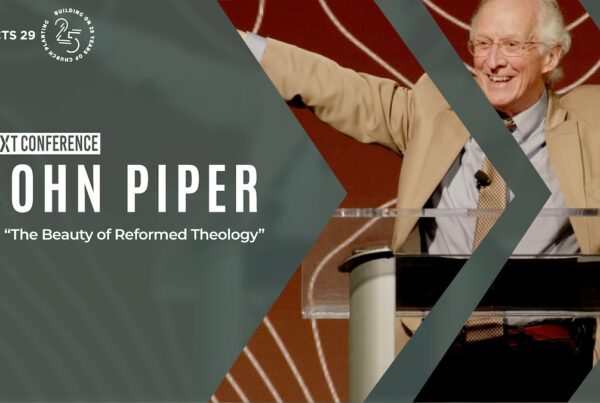This is part 2 of our series looking at our theological distinctives and their application to church planting; for the introductory post (Joining the Dots) use the link at the bottom of the page.
We’re going to reflect on one of our core convictions within Acts 29 – the work of the Holy Spirit for life and ministry. Here’s what we say:
We recognize and rest upon the necessity of the empowering presence of the Holy Spirit for all of life and ministry.
Notice that specifically we hold to the necessity of the work of the Spirit for our life, others’ lives, and all our ministries.
Let’s consider the Spirit’s work, how the Spirit works, and some implications for us today.
We recognize and rest upon the necessity of the empowering presence of the Holy Spirit for all of life and ministry
The Spirit’s work
The Spirit’s work is wide and far ranging because God works by his Spirit. Hence virtually anything God might be said to do we could also say the Spirit does; more precisely we can say, God the Father does by his Spirit. So God speaks by his Spirit through the prophets (Nehemiah 9:30); God creates by his Spirit (Psalm 104:30); God is present by his Spirit (Psalm 139:7); and more.
But the Spirit’s work in salvation focuses on Jesus, through whom the Father accomplished salvation. Jesus says the Holy Spirit will be sent in a new way after his departure specifically to glorify him (John 16:12-15). That will specifically mean bringing conviction about sin and about Jesus to those who hear the message of the gospel. Paul says we can only understand the truth of the gospel by the Spirit (1 Corinthians 2:6-16). This is the Spirit’s ‘spotlight’ ministry: to shine on Jesus so we see him clearly.
Hence when we read that the Lord opened Lydia’s heart to respond to Paul’s message (Acts 16:14), we should understand he did so by his Spirit. When we read that the Lord’s hand was with those speaking the gospel such that many turned to the Lord (Acts 11:21), we should understand the Spirit was at work.
The Spirit then is the source of new spiritual life in us (John 3:5-8). We are brought to see the truth of the gospel and to trust in Christ by the Spirit. Hence Paul says that if we are ‘in Christ’ through faith then we must have the Spirit (Romans 8:9).
This is the Spirit’s ‘spotlight’ ministry: to shine on Jesus so we see him clearly.
The Spirit then also empowers our spiritual life. This includes leading us into holiness such that we produce his fruit (Galatians 5:16-26); enabling relationship with the Father (Romans 8:14-16; Galatians 4:1-6); strengthening gospel proclamation (Acts 4:31); bringing unity between believers (Ephesians 4:3; Philippians 1:27); and gifting for service in the life of the church (1 Corinthians 12:4-11). In this way the Spirit in us is the down payment or deposit that guarantees God’s future work in us (Ephesians 1:13-14; 2 Corinthians 5:5). This is all part of the blessing of the new covenant which is characterised by the work of the Spirit (Jeremiah 31:31-34; Joel 2:28-32).
Progress in the Christian life is then only possible by the Spirit. While we are to believe, obey, fight sin, serve and more, all this depends on the prior work and ongoing work of the Spirit in us. That will have profound implications for ministry as we will see below.
How the Spirit works
Much of the Spirit’s work is internal and hidden from us. However there are two key connections in Scripture that we must recognise and appreciate.
First is the connection between the Spirit and the word of God. Jesus makes a tight connection between the Spirit and words of truth (John 16:12-15) and Paul does so too (1 Corinthians 2:6-16; Ephesians 3:5). The Spirit reveals truth originally (the inspiration of Scripture) and then reveals that truth as people read the word (illumination of Scripture). So the sword of the Spirit is the word of God (Ephesians 6:17).
So the power of the Spirit in conversion is not seen by ‘automatic’ revelation to people but by preaching the gospel which the Spirit then uses (1 Corinthians 2:4). The writer to the Hebrews quotes Psalm 95 with the introduction ‘As the Holy Spirit says…’ (Hebrews 3:7). The Spirit spoke Psalm 95 through David and is still speaking Psalm 95 to us today. So to hear God speak by his Spirit we read his word.
The presence of the Spirit will be seen in love for God’s word, and a right understanding and speaking of that word.
Throughout church history some have misunderstood the work of the Spirit in believers to mean the word of God is redundant, or is a kind of prop for those who can’t listen to the Spirit properly. Such positions don’t appreciate the connection between word and Spirit. In fact the presence of the Spirit will be seen in a love for God’s word, a right understanding of that word, and a speaking of that word.
The second key connection is the work of the Spirit and the people of God. God ministers by his Spirit through other people. We see a prime example of this in the discussion of gifting in 1 Corinthians 12. The gifts are gifts of the Spirit through which God is at work in people’s lives (1 Corinthians 12:4-6). As these gifts are used, people are built up in the faith. This means that people must use the gifts of the Spirit for God to work by his Spirit.
Similarly, being filled with the Spirit is seen in speaking to each other (Ephesians 5:18-19). The speaking of the gospel is done through people by the Spirit (1 Peter 1:12). Rejecting God’s instruction through people is to reject God’s work by his Spirit (1 Thessalonians 4:8).
Hence while much of the Spirit’s work is personal (we call God ‘Father’ by the Spirit) we must not individualise his work. We must keep our understanding of the Spirit connected to our understanding of the church – the Spirit-filled people of God. The Spirit will be active as we interact with each other. So to experience the Spirit’s work I don’t sit on my own, I engage fully in the life of the church.
Both of these connections are to say that the Spirit uses ‘ordinary means’ – the word of God and the people of God. So there is a supernatural ordinariness to ministry. We spend time with people, we organise church life, we speak the word, we extend hospitality – and as we do so, the Spirit works.
Implications for us today
What should be clear is the truth of our initial statement: the necessity of the work of the Spirit for life and ministry. The Christian life is by definition a Spirit-generated and Spirit-empowered life; there is no other kind of life. Christian ministry is done in and by the Spirit; there is no other sort of ministry.
This leads to some profound implications.
1. Humility
As church planters we remain humble because we do not ‘achieve’ anything…any growth is from God by his Spirit.
We remain humble because we do not ‘achieve’ anything. We may be planning on planting a church or we may have planted a dozen, but we will know that any and all growth is from God by his Spirit. Looking forward we will speak of our need for him to work; looking backwards we will speak of gratitude for his work.
We will work hard ourselves but we know all our work is because of God’s work in us (1 Corinthians 15:10; Colossians 1:29). God may achieve great things through us, but we know that he is the one building his church (Matthew 16:18).
We may have gifts God uses to bring people to faith and grow people in the faith. But we know that the gifts are gifts of the Spirit, and whatever is achieved through them is because he is at work.
And so we have great reason to remain humble. The Puritan minister Richard Baxter, through whom God achieved much, spoke of himself as a ‘pen in God’s hand.’ And so he asked, ‘What praise is due a pen?’ You don’t praise the ‘pen’ you praise the writer. We are what we are in our own life through the work of the Spirit; we will achieve whatever we achieve in ministry through the work of the Spirit, and so we remain humble. All the praise goes to him.
2. Dependence
We remain dependent on God to work by his Spirit because there is no growth without him. There is no true growth in our own life without the gracious work of the Spirit enlightening us and strengthening us. There is no ministry of value we do without the Spirit gifting us and working through us.
Hence we are dependent on the Spirit. That dependence feeds into the humility we’ve mentioned and will flow out into thankfulness for whatever is achieved, but will be seen most clearly in prayer. A church which takes the work of the Spirit seriously, prays seriously. We are so keenly aware of our own impotence to bring people to faith and our inability to grow people in the faith (including ourselves) that we cry out to God to be at work. This is what we see in Paul’s prayers for his people (e.g. Ephesians 1:17).
As we embark on planting we will be on our knees expressing deep dependence on God. And years down the line with a plant well established and church life ticking over, we should remain on our knees.
3. Confidence
The work of the Spirit will also make us very confident. We cannot convince people of their need of Jesus or make them see him clearly – but the Spirit can. We cannot create unity in the church or grow people in godliness – but the Spirit can. We cannot understand the word or speak it with power by ourselves – but the Spirit can.
As we start a church plant we can be confident – because of the work of the Spirit.
As we start a plant we can be confident, because of the work of the Spirit. As we struggle on in ministry and wrestle with issues in church life, we can be confident because of the work of the Spirit.
It is a strange sort of confidence because in our culture we only really know of confidence that arises from within us; we are so used to confidence coming from believing in ourselves. But here the source of confidence is outside of us; it is because we believe in him. But that outwardly placed confidence in the person and work of the Spirit means we can be confident in ourselves and our work – because he is at work in us and through us.
The necessity of the work of the Spirit will be seen in humble, dependent confidence in ministry.












